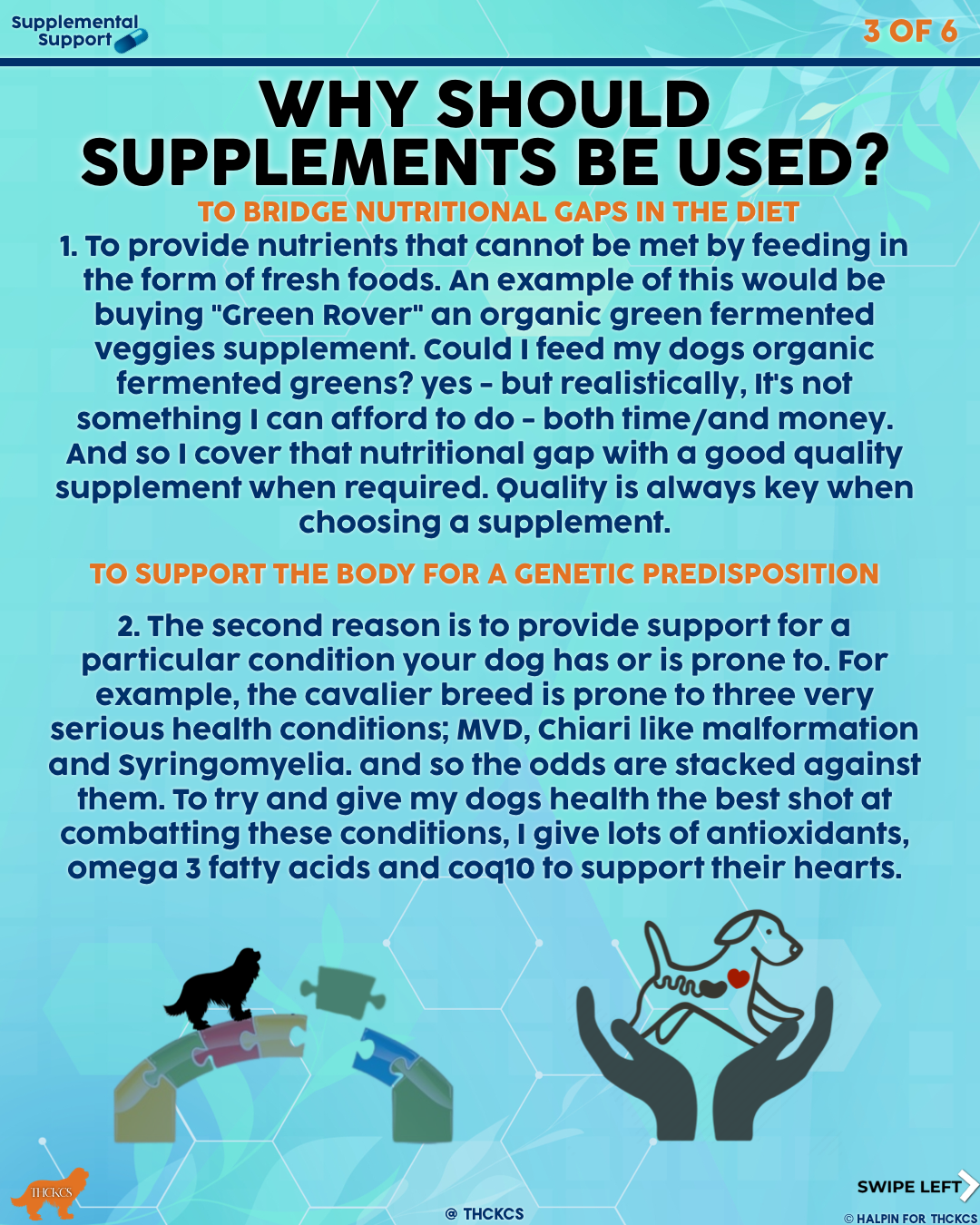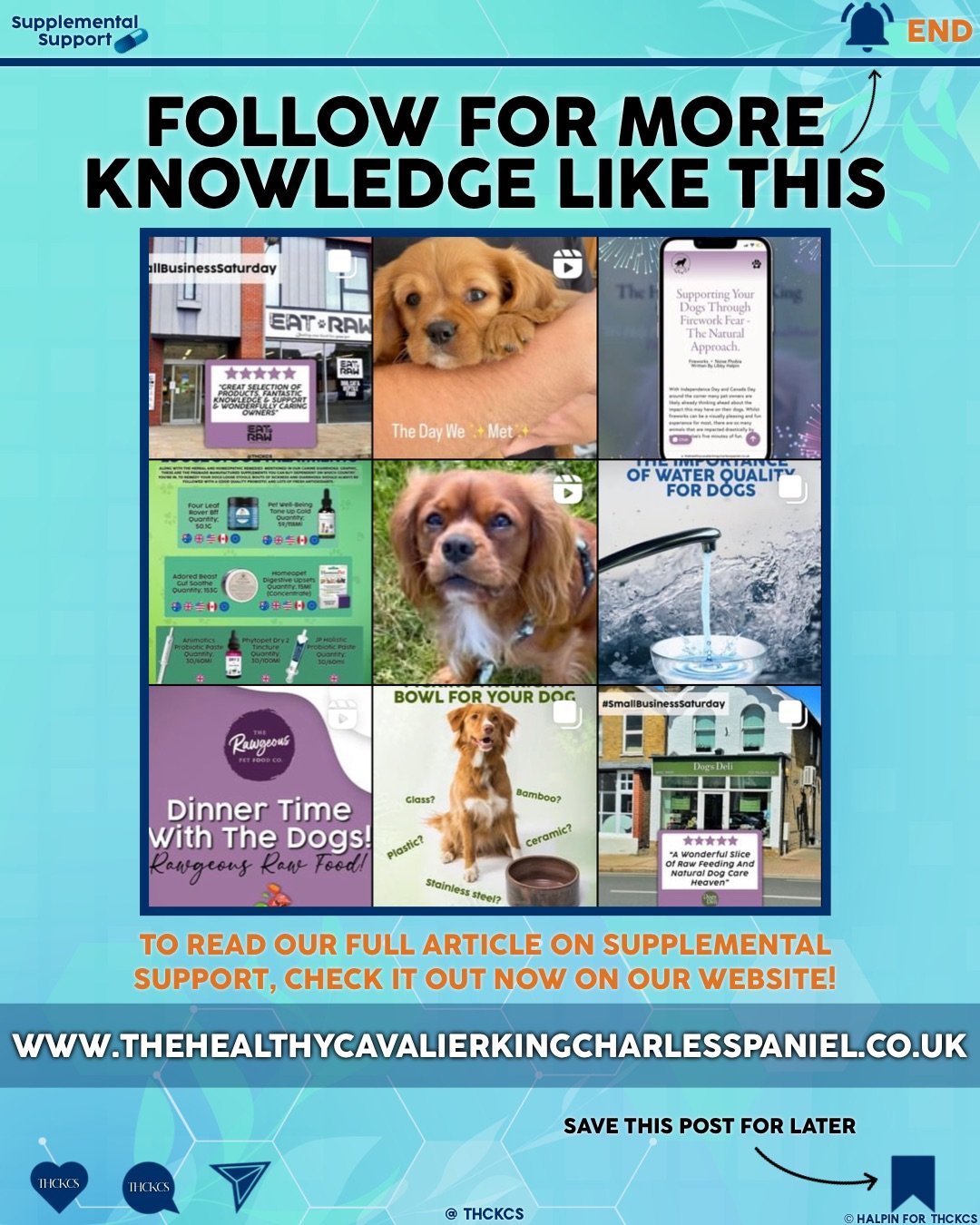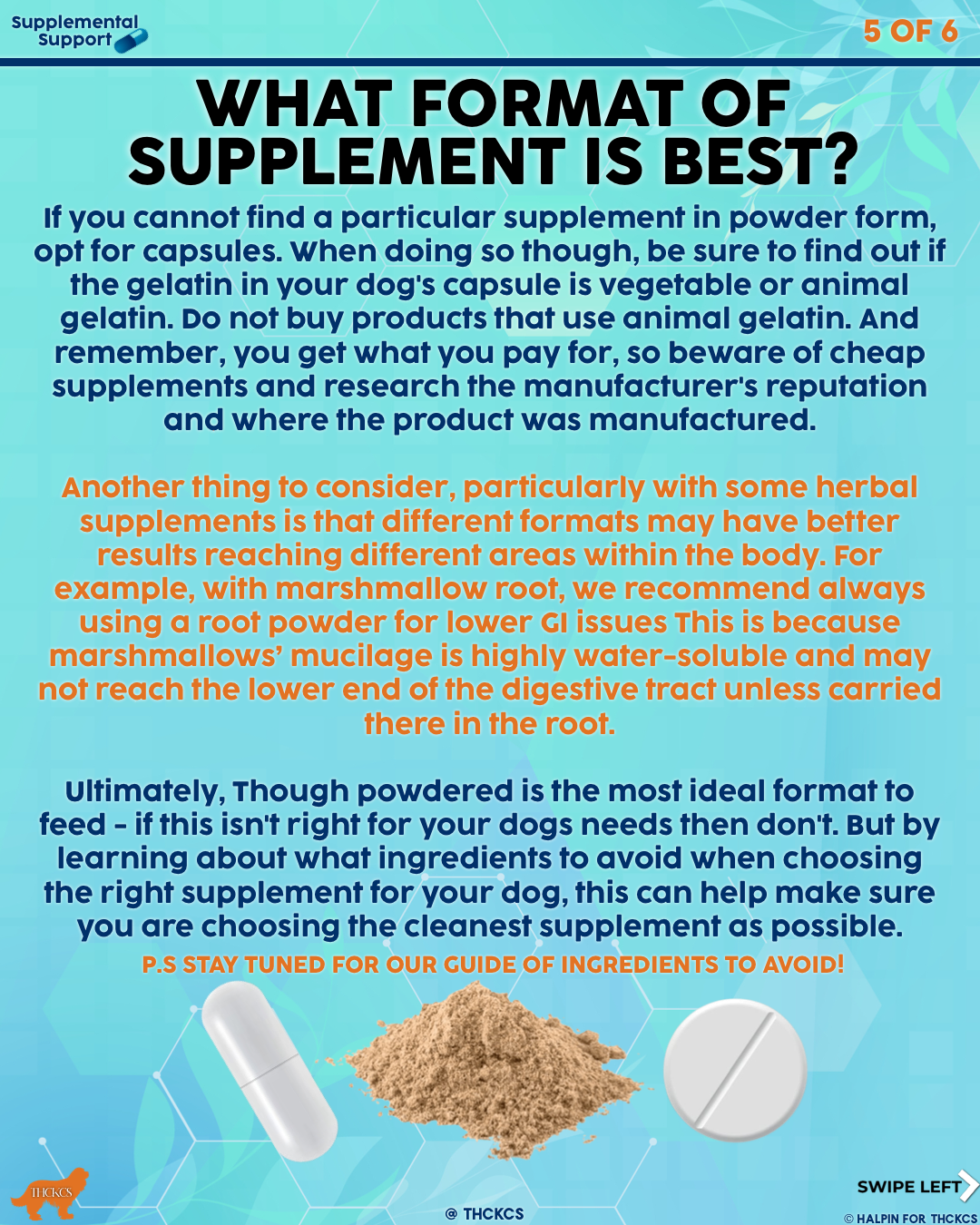Supplemental Support - The “what, when and why” supplements should be used for dogs






There are millions of supplements on the pet market now. As well as foods and vaccines that contain inactive ingredients, most of these inactive ingredients shouldn't be relied upon so frequently or be included in these but they are. Whilst most supplements today contain fillers, preservatives and toxic ingredients, we recommend, where possible to look for supplements with either none or the least amount you can find. And learn what these ingredients are so that you always know which ingredients to avoid at all costs.
I love clean, whole food supplements and believe very much in their place within canine nutrition. I used to give out supplement recommendations far more frequently however I feel that there is a lot of supplement overuse within the industry and I also feel it’s important to highlight that. Before giving a supplement, I believe the whole dog should be taken into consideration and whole food supplements should be utilised first and foremost where that cannot be achieved then a minimal synthetic supplement should be used if it is to benefit the dog's health and well-being considerably.
It’s hugely important to know and understand the correct circumstances of when supplements should be used, for them not to be too heavily relied upon or misused.
Why should supplements be given?
For me, there are 2 reasons why supplements should be used
1. To bridge nutritional gaps within the diet; Provide nutrients that cannot be given in the form of fresh foods. An example of this would be buying A whole foods supplement like "Green Rover", organic green fermented veggies. Whilst I could feed my dogs organic fermented greens, realistically It's not something I can afford to do with both time/and money - I also have one dog who will not eat fresh plant matter. And so I cover those gaps when I am feeding an 80:10:10 diet with a good quality whole food supplement. Quality is always key when choosing a supplement - but I'll speak more on that later.
2. To support the body for a genetic predisposition or health condition; The second reason is to provide support for a particular condition your dog has or is prone to. For example, the cavalier breed is prone to three very serious health conditions; MVD, Chiari-like malformation and Syringomyelia. and so the odds are stacked against them. To try and give my dog's health the best shot at combatting these conditions, I give lots of antioxidants, omega 3 fatty acids and coq10 to support their heart. This could also apply to the environment your dog lives in - for example, if your dog is going to be reared in a city where there is a higher rate of pollution, EMF's etc, it may be a good idea to supplement the diet with more detoxifying foods.
And the when?
The bottom line? Always try to supplement with fresh whole foods first and when that is not an option, I would recommend using high quality, clean supplement.
I have previously covered what ingredients to avoid when looking for a supplement and unfortunately, there are more unclean supplements than clean ones. and a lot of unclean supplements are often recommended by even the most notable!
I know I am pickier than most when it comes to ingredients. That being said, sometimes, when a supplement must be given you do need to pick the best from a bad bunch and so some (Although limited) supplements you may have seen me recommend may have some of the undesirables that I typically recommend to avoid - but are there because the supplement is deemed necessary.
Be aware of differing nutrient formulations
Often, supplements for other animals and sometimes humans can be recommended as a cheaper alternative to those marketed for dogs and whilst this may sometimes be the case, it’s also important to remember that different animals will absorb nutrients in different ways. Different species will also have very different requirements for vitamins and minerals and the levels of these will be species-specific. It is also worth remembering that the same 1 vitamin can come in many different forms and different species may only be able to absorb it if it is carried in a particular way the changes in formulations will allow for these absorption differences.
Though this isn’t the case for all, certain supplements would be dangerous if used on a different animal at the wrong levels and this is always worth taking into consideration when looking for a supplement as buying a product marketed for a different species may not always be hugely beneficial for both dog and owner.
Don’t over-do it!
Lastly, it’s important to mention that I highly recommend pet owners not to overload meals with everything - I only add a maximum of four supplements per meal and I vary them through the week. Not only do I vary the supplements through the week I rotate each supplement type seasonally, by doing this, you are also ensuring your dog receives a variety of vitamins, fats, and nutritional profiles. It also helps to ensure your dog does not receive too much of one thing.. If a recall ever happens with a brand or product, I at least know that my dogs have had limited exposure vs. having used that brand or product for years at a time. Your dog will thank you for adding variety to their life.
Before buying a supplement, make sure you have carefully researched the brand and the ingredients of the supplement - you can check our list below of ingredients to avoid. You'll also want to ensure the ingredients aren't duplicated in other supplements and therefore could overload your dog - for example, I use two supplements that contain sulforaphane - these cannot be used together but they can be used in meals separately.
Tablets, capsules or powder?
Where possible, seek out a supplement in powder form rather than tablets or capsules. This is because those forms, almost always have coatings Or are made out of gelatine.
If you cannot find a particular supplement in powder form, opt for capsules. When doing so though, be sure to find out if the gelatin in your dog's capsule is vegetable or animal gelatin. Do not buy products that use animal gelatin. And remember, you get what you pay for, so beware of cheap supplements and research the manufacturer's reputation and where the product was manufactured.
Another thing to consider, particularly with some herbal supplements is that different formats may have better results reaching different areas within the body. For example, with marshmallow root, we recommend always using a root powder for lower GI issues This is because marshmallows’ mucilage is highly water-soluble and may not reach the lower end of the digestive tract unless carried there in the root.
Ultimately, Though powdered supplements are the most ideal format to feed - if this isn't right for your dog's needs then don't. But by learning about what ingredients to avoid when choosing the right supplement for your dog, this can help make sure you are choosing the cleanest supplement as possible.
Patricia Jordan DVM writes; “Tablets are worse than capsules for several reasons:
Coatings (even coatings from natural food sources) are bad. Believe it or not, most natural coatings are made from beetle wings and other bug parts! Very high-temperature processing depletes nutrients.
Petroleum-derived chemicals like ethyl cellulose (as a solvent)
Methylene chloride (as a coating is a known carcinogen)
Synthetic dyes and flavourings like red 40 and yellow 5 - are also carcinogens.
Artificial sweeteners BHA, BHT/and the (chemical antioxidants are used as coatings and dyes). These are known to cause behavioural problems in children. What about our pets? They're almost certainly affected too.”
If you cannot find the particular supplement you want in powdered form, opt for capsules. When doing so though, be sure to find out if the gelatin in your dog's capsule is vegetable or animal - animal gelatin should be avoided where possible. never buy products that use animal gelatin. And remember, research where the supplement was sourced from and made in - Though of course, it’s impossible to tar all supplements with the same brush, for instance, four-leaf rover use mushrooms that are grown in china - yet the company is one of the best in their business at producing mushrooms.
Ingredients to avoid
I have marked the ingredients with an asterisk for ingredients that I believe, are to be avoided at all costs where possible.
The categories of ingredients to avoid are;
1. Flavourings and sweeteners - Things like; Sucrose, Fructose, Maltodextrin, Sorbitol and Maltin.
2. Binders - Things like; Lecithin, Honey, Sorbitol, Gum Arabic, cellulose.
3. Fillers - Things like; Cornstarch, lactose, cellulose, and calcium phosphate.
4. Disintegration acids - Things like; Alginic acid, sodium carboxymethylcellulose, and sodium starch glycolate.
5. Lubricants and flow agents - Things like; Magnesium stearate, Calcium stearate, Stearic acid and silica.
6. Artificial colours - things like; FD&C Blue No. 1, Blue No. 2, Green No. 3, Red No. 3, Red No. 40, Yellow No. 5 And Yellow No. 6.
7. Coating materials - Things like; carnauba, Zein, Hydroxyproply methylcellulose (HPMC), Methyl hydroxyethyl cellulose, Ethylcellulose and Povidone.
8. Artificial Preservatives - Things like; nitrates, benzoates, sulfites, sorbates, parabens, selenium and sulfur.
9. Gums - Things like; guar gum, Arabic gum,tragacanta gum and karaya gum.
10. Types of HYDROGENATED OILS - things like; peanut oil, canola oil, and soybean oil.
*Animal Liver Meal
*Artificial colourings
*Artificial flavours
Ascorbyl palmitate - (preservative, sourced from corn)
*Benzoic Acid
*BHA
*BHT
baker's yeast (Saccharomyces cerevisiae)
Beet Syrup
Black malt extract
Brewers dried yeast
Brown Rice Syrup - (all rice contains arsenic)
*Canola oil
*Carrageenan - carcinogenic
*Citric Acid - (corn-based) also called Sodium Citrate
*Corn Oil
*Corn Starch or Starch
*Corn Syrup
Calcium Stearate
Cellulose (propylene glycol ether of cellulose)
Dicalcium phosphate
*Dextrose
*Ethoxyquin
Fish Meal
Flaxseed Meal
Gelatin - (corn carrier)
Gelatin By-products
Gum resin
*Glucose syrup - (corn-based)
Hydroxypropyl
*Hydrolyzed Vegetable Protein
Lactose
Lignosulfonate
*Lecithin (soy)
*Maltodextrin - (corn-based)
*Menadione Sodium Bisulfite Complex
*MSG
Magnesium silicate
Magnesium stearate
Methylparaben
Microcrystalline cellulose
*Nutmeg
Phosphoric acid
*Polyethylene glycol (PEG)
*Potassium Sorbate
*Propylene glycol
Polyethene Oxide
Potassium Sorbate - (preservative)
Potato Flour
Potato Starch
Poultry Meal
Propionic Acid
Propionic Acid - (preservative)
Propylparaben
Rosemary Extract - (hidden MSG)
*Rice Flour (all rice contains arsenic)
*Rice Powder (all rice contains arsenic)
Salt
Silicon dioxide - (some concerns with particle size)
Starch
Sunflower Lecithin
*Safflower Oil
*Sodium benzoate
*Sodium Bisulfate
*Sorbic acid - (a preservative)
*Sorbitol
*Soy
*Soybean Oil
*Soybean protein isolate
*Stearic acid
*Sucralose
*Sugar
Titanium Dioxide
*TBHQ - (Tertiary butyl hydroquinone)
*Vegetable oil
*Vegetable Shortening
Wheat Grain
Wheat Middlings
Wheat Protein Isolate
Xanthan Gum
Yeast
There are a lot of cheap and poorly made supplements on the market and whilst you may see some benefit from their use - long term use could cause more harm. We try and provide as many supplement guides as possible for the "essentials", to help pet owners make the cleanest choices for their pets - you can find these in one place on our Facebook group or our Instagram linked below.
Of course, if you have any questions about supplements or if you need help with finding the right supplement for you and your dog, let me know and we can help you!
Sources;
https://www.health.harvard.edu/staying-healthy/the-hidden-dangers-of-dietary-supplements
https://tespovitamins.com/vitamins-contain-additives/
https://biobalanceinstitute.com/health-news/6-toxic-ingredients-probably-didnt-know-vitamin/
https://achs.edu/blog/2016/12/02/dangerous-supplement-ingredients/
https://www.dogsnaturallymagazine.com/supplements-for-your-dog-hidden-ingredients/
https://www.drlaurendeville.com/articles/common-supplement-additives-avoid/
https://www.nejm.org/doi/full/10.1056/NEJMsa1504267
https://www.dogsnaturallymagazine.com/the-truth-about-dog-food-and-supplements/
